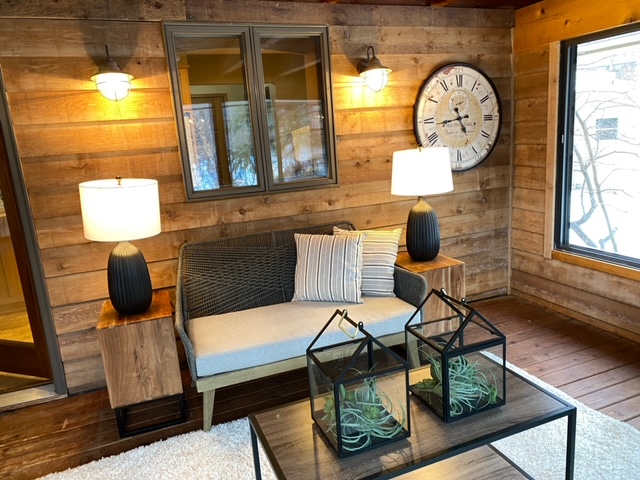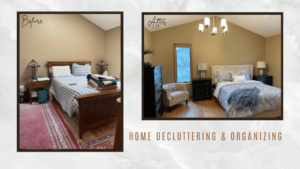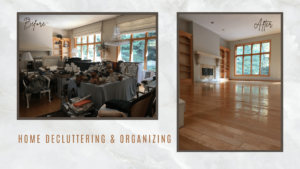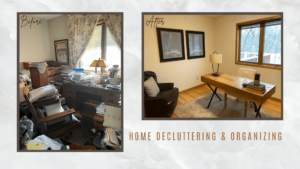
WHY DECLUTTERING ACCELERATES THE SALE OF A HOME & HOW TO IMPLEMENT IT SUCCESSFULLY
Nearly every professional real estate agent or home stager will tell you how important it is to declutter your home before selling it. “Decluttering” is a universal term for putting your personal items away, leaving spaces clear from things that distract from the home and its potential for a new owner. The process involves putting away extraneous belongings, making way for clear lines of sight, and removing visual distractions. Buyers would prefer not to see things that feel personal to the seller and messy to the eye. However, in a pandemic when we are working from home, children are in classes at home, and more of our lives are spent at home, this decluttering is a tall order.
Does decluttering really matter? After all, the buyer has a home too, filled with personal items, and can certainly understand. The answer is yes. Buyers are looking for the magazine cover page, the Instagram® image, and the HGTV® reveal. As more than a third of home buyers are now in the millennial age range, they are seeking the picture-perfect home as promoted on social media and television networks.
As a professional home stager, I have seen some cluttered homes that can be deemed “real hot messes” – to use my southern emphasis. Many of these cluttered homes have been on the market for months, and by walking into the front door, I’ve tiptoed around items and personal belongings. The buyers have likely walked the same maze of belongings when touring the house. I’ve also viewed properties where sellers collect lovely things that they display on shelves and dressers, in china cabinets, and throughout the house in various places. While perhaps neatly placed, these items draw curious glances and distract from the property itself. I have also spoken with sellers who refuse to believe that their personal items are cluttered and thus have paid the price with time on the market and/or lower sales prices.
Growing up, my mother had a mug that read, “Great Minds Have Messy Desks.” The sentiment was accurate, given that my mother’s desk was often very cluttered. She could find anything she needed, but the desk was definitely a mess. Her desk functioned perfectly fine for her because our house wasn’t for sale. However, if your home is on the market, a messy desk or a messy bathroom, for example, could have poor implications when prospective buyers tour the home.
To some the idea of decluttering is daunting, especially if you are not an organized person, cherish your collectibles, or have a “real hot mess,” in your home. From my home staging experience, I have learned some tips and strategies for making the process a little easier and less intimidating.
- COUNTER CLUTTER
Start with horizontal surfaces, like tabletops and countertops – these surfaces should be free and clear of almost everything. A buyer’s eye should not be stopped from observing a home from floor to ceiling with items that interrupt the horizonal flow of the space.
In the kitchen, exceptions may be daily use items (like a coffee pot or bowl of fruit). Everything else should be put away in the cabinets or drawers. Likewise, in the bathroom, no buyer wants to see your toothbrush, used bar of soap, collections of lotions, or other hygiene items. Tuck these items away out of view.
Finally, in living spaces, dining rooms, and bedrooms, clear shelving of items smaller than a man’s fist. Anything else should be carefully analyzed for color and curiosity. If it is odd or brightly colored, it should probably be tucked away.
- FLOOR CLUTTER
Aside from furniture and large planters, nothing should take up valuable floor space. The more floor space uninterrupted, the bigger the room will feel. (This may even include removing rugs.) Small statutes, umbrella stands, tray tables, baskets, etc. should be packed away. These items conflict with the scale of most rooms and while functional for day-to-day use, are unnecessary for the staging of the home.
Kids’ bedrooms should be free from toys on the floor and as much as possible, any other items that take up floor space. While many buyers give grace to children’s rooms, it is in the best interest of the seller to remove as much clutter as possible for a room to feel large and tidy, creating a positive impression for buyers.
- WALL CLUTTER
Keep art to a minimum. Remove any art pieces that are off-scale (most often art that is too small). Art with strong subject matter should also be taken down. While it may be tempting to think that a cool gallery wall could be a great way to showcase art, gallery walls require very careful measurements and installation. In my opinion, one thoughtfully placed art piece per room is generally enough and should be placed on the first visible wall when entering the room.
- WHEN IN DOUBT, TAKE IT OUT
Less is always more when preparing a home for sale. If you are struggling with whether an item is cluttered, it probably is. Many people feel that their home will be too sterile after they declutter. In fact, clean and clear is quite attractive and allows a buyer to see the qualities of the home (space, character, amenities, etc.) without being distracted by personal “stuff”. It may be helpful to engage the services of a professional home stager to provide assistance and direction. When selling a home, it is essential to present the home at its best to potential buyers.
Here are some before and after photos of the property that Showhomes Minneapolis decluttered:



Article credits to Lorelie Brown, M.A., CPRES, CID is the Owner of Showhomes Charleston in Charleston, SC. RESA-PRO member, an HSRA-Elite Member, and HSRA Elite Leadership. She is passionate about the power of home staging and has staged over $300 million in real estate.
